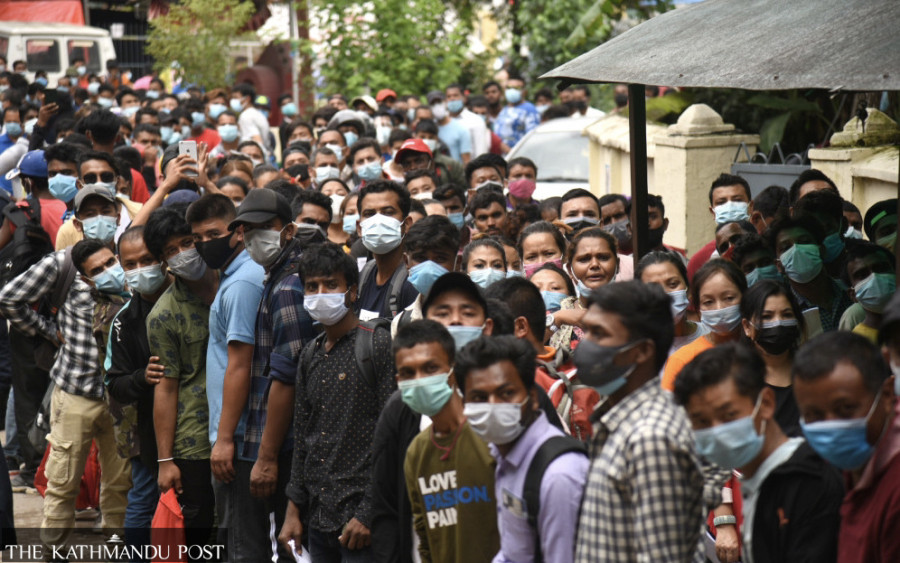Health
As Nepal is getting jabs, vaccine administration presents new challenges
Experts warn that crowded immunisation centres could turn into virus hotspots. Authorities urge the public to register for vaccination but the response has been lukewarm.
Arjun Poudel
Three months ago, Jagriti Aryal Bhandari, from Pokhara registered online for Covid-19 vaccination, as the authorities had asked the general public to do so.
Bhandari, 40, a schoolteacher by profession, also asked her 19-year old daughter to register for vaccination.
“But as of now, no one has contacted us for vaccination,” Dr Tulsi Ram Bhandari, her husband, told the Post over the phone from Pokhara. “We had hoped that authorities would contact us and ask to go to the nearby immunisation center for vaccination but that did not happen.”
The Ministry of Health and Population had asked the general public three months ago to register online for vaccination by filling a form and also made it clear that it was voluntary.
Those who registered were given a number but nothing has happened since.
On Saturday, secretary at the Health Ministry Dr Roshan Pokhrel said that the government will prioritise jabs for those who have registered for them.
According to him, so far only 1.4 million people above the age of 18 have registered for vaccination.
But asking people to register online for vaccination raises the question of equitable distribution of vaccines, according to experts.
“When the government knows that everyone cannot fill the online form as they do not have access to the internet, why are officials saying that priority will be given to those who have filled the online form?” said Dr Bikas Lamichhane, former chief of National Immunisation Programme. “If such a decision was made for better management, authorities should ask only people of certain age groups to come for immunisation on certain days.”
The chaos at immunisation centres has been apparent with long queues, people in target age groups returning home without getting vaccinated because centres have run out of them, and people using influence to get jabs.
Even after getting vaccinated, there have been unmanageable crowds of migrant workers flying abroad to get vaccination certificates.
“When even the citizenship certificate comes in both English and Nepali, didn’t the officials know people will seek vaccination certificates in English?” said Bhandari, the husband, who is also an assistant professor of public health at Pokhara University. “The ad-hoc decisions show how the government system functions in Nepal.”
Health Ministry officials say that the issue of crowding for vaccination certificates has now been addressed as it has set up three additional centres to provide certificates for those going abroad, in addition to Sukraraj Tropical and Infectious Disease Hospital at Teku, Kathmandu.
“People can get certificates from Civil Hospital, Patan Hospital and Armed Police Force Hospital also,” Dr Samir Kumar Adhikari, joint spokesperson for the Health Ministry, told the Post. “Problems have arisen after some countries demanded certificates validated by an authorised government agency or quick response (QR) codes.”
According to him, immunisation certificates can be provided from the provincial hospitals also to address the woes of the public.
The Covid-19 vaccination campaign has been dogged by poor management from the start.
The Health Ministry began the vaccination campaign on January 27 with immunisation of frontline workers, sanitation workers, security personnel deployed for the management of bodies of infected people, people residing in old-age homes and prisoners but later the jabs were also administered, based on ad-hoc decisions, to journalists, bureaucrats, local unit employees, staff at banks and financial institutions, employees of diplomatic missions, and people’s representatives, among others.
With more Covid-19 vaccines arriving, experts have warned of more chaos unless the management issues are addressed.
Besides the 4 million vaccines that Nepal bought from a Chinese company arriving in batches, officials have said they have reached the final stages of a deal to get another 6 million doses from the same company. The 1.6 million doses that Japan has given in a grant through the COVAX facility are arriving within a week, according to officials. India too has assured of the resumption of vaccine supplies.
“It seems that as more vaccines come, there will be more chaos and immunisation centres could turn into virus spreading centres,” an official at the Health Ministry told the Post, asking not to be named.
Meanwhile, much of the daily activities have resumed in Kathmandu Valley and most of the country. Public transportation, banks, malls and government offices could turn into clusters for coronavirus infections, doctors say.
Of late new cases have started to rise sharply, which public health experts blame on increasing mobility, people’s disregard for the safety measures and the authorities’ failure to enforce restrictions.
On Sunday, the Health Ministry reported 1,539 new infections, slightly down from 2,309 on Saturday. The positivity rate continues to be high. While it was 15 percent on Sunday, it rose to 22 percent on Saturday.
“The issue is purely a management issue and it is not only limited to the immunisation centre,” Dr Mingmar Gyelgen Sherpa, former director general at the Department of Health Services, told the Post. “All agencies should shoulder their own responsibilities.”
Experts have also warned that the unmanaged queues for vaccine and vaccination certificates could turn into virus hotspots.
“Consequences of the ongoing crowds at vaccination centres and vaccination certificate distribution will be seen after two weeks,” Lamichhane, the former chief of National Immunisation Programme, told the Post. “These things, which can easily be resolved, should not be an issue. Officials might have been doing something to address these problems.”
Authorities, on the other hand, express their helplessness.
“I have raised the issue of crowds at vaccination centers several times during the meetings with the Health Ministry officials,” Dr Shyam Raj Upreti, coordinator of Covid-19 Vaccine Advisory Committee, told the Post. “If we cannot manage the crowds, people will be infected from the immunisation centres and certification distribution centres.”
As for the online registration for vaccination, Adhikari, the joint spokesman, concedes the government’s failure to implement its decision.
“Policy was made long ago, but due to the failure to implement the policy, problems have arisen,” said Adhikari.




 27.41°C Kathmandu
27.41°C Kathmandu















